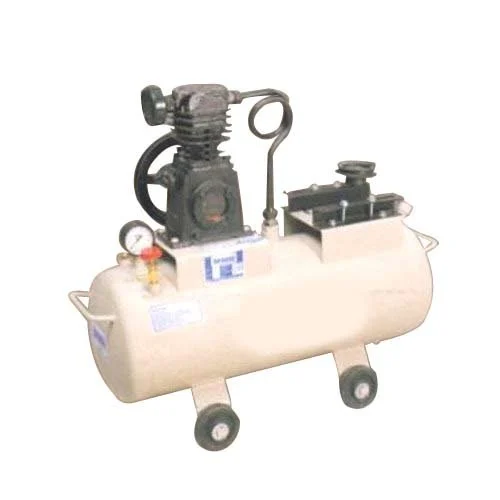Aerotech Single Cylinder Air Compressor
₹21,575.0
| Minimum Order Quantity | 1 Piece |
| Maximum Flow Rate | 2 – 3 cfm |
| Compressor Brand | Aerotech |
| Horse Power | 1 HP |
| Discharge Pressure | 6 Bar |
Our organization, ‘Spares Source’, was established in the year 2005. We are operating as a supplier and exporter of a quality range of Compresses Air Dryer & Accessories. We offer Air Compressor, Air Receiver Tanks, Vertical Compressor, Temperature Pressure Gauge, Water Cooled Aftercoolers, Cooling Towers, Cooling Tower Spare Parts, Pressure Transmitter, Bimetal Thermometers, Humidity & Temperature Transmitter, PID Controllers, Process Scanner & Data Logger, Signal Isolater, Pneumatic Components, Screw Compressor Spares, Air Line Accessories, Pneumatic Cylinder Accessories, Pressure Calibrator & Cylinder, Brass Fittings and Temperature Indicator. All the products that we offer are highly durable and precision engineered for long-lasting performance. Our sophisticated technology enables us to supply the most variegated products & equipment for industrial usage as per the clients’ requirements. Some of the major consumers of our products include Textiles, Iron Foundries, Paper Industries, Power plants, Automobiles and others.
You must be logged in to post a review.
Q & A
Compressed air receivers, also known as air storage tanks, are commonly used in various industrial applications to store compressed air for later use. The sustainability of a compressed air receiver depends on several factors:
Energy Efficiency: Compressed air systems are known for their relatively low energy efficiency. When compressed air is stored in a receiver, there is a potential for energy loss due to leaks and heat transfer. To improve sustainability, it's important to design and maintain the system to minimize air leaks and implement insulation to reduce heat transfer.
System Design: The design of the compressed air system, including the receiver, plays a significant role in its sustainability. Properly sizing the receiver to match the demand can help optimize energy usage and reduce unnecessary cycling of the compressor. Additionally, incorporating efficient control mechanisms, such as variable speed drives, can further enhance the system's sustainability.
Maintenance and Leakage: Regular maintenance is crucial to ensure the sustainable operation of a compressed air receiver. Inspecting and repairing leaks promptly can prevent energy wastage and reduce the overall environmental impact. Implementing a leak detection and repair program can help identify and fix leaks in a timely manner.
Material Selection: The choice of materials used in the construction of the compressed air receiver can impact its sustainability. Opting for materials that are durable, corrosion-resistant, and recyclable can extend the lifespan of the receiver and reduce waste generation.
Integration with Renewable Energy: To enhance sustainability, compressed air systems can be integrated with renewable energy sources. For instance, using solar or wind power to generate electricity for compressors can reduce the reliance on fossil fuels and decrease the environmental footprint of the system.
Life Cycle Assessment: Conducting a life cycle assessment (LCA) of the compressed air system, including the receiver, can provide a comprehensive understanding of its environmental impact. LCAs consider the energy consumption, raw materials, manufacturing processes, transportation, usage, and disposal of the system. This analysis helps identify areas for improvement and guide sustainable decision-making.
It's worth noting that compressed air should be used judiciously, as it can be an inefficient form of energy compared to other alternatives. It is advisable to evaluate whether compressed air is the most suitable choice for a given application, considering factors such as energy efficiency, cost-effectiveness, and environmental impact.
General Inquiries
There are no inquiries yet.





Reviews
There are no reviews yet.